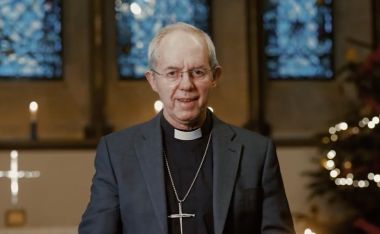Archbishop reflects on human mortality and fragility in Christmas sermon

The Archbishop of Canterbury used his Christmas Day sermon to remember volunteers and the scientists who have made the vaccine possible.
Preaching from Canterbury Cathedral, Archbishop Justin Welby singled out in particular the volunteers helping refugees who have come across the English Channel.
"There have been the volunteers who have been on my mind, welcoming and caring for refugees arriving on the beaches so close to this cathedral," he said.
"Those volunteers are extraordinary people, especially the crews of the RNLI. I saw them the other day, just getting on with it - five times as many callouts as they've ever had in the history of the Dover lifeboat, and they do one thing – save life at sea."
He added, "It's not politics, it's simply humanity."
But the Archbishop also reflected on the mortality and fragility of mankind, and how the pandemic and refugee crisis have revealed the limits of humanity.
"It was a national theme again this year – in fact it became a trending topic in the news from the summer onwards – could Christmas be saved?
"The saving of Christmas was apparently in the hands of the politicians, the scientists, the lorry drivers, the supermarkets and according to one commentator a couple of weeks back, even that most unlikely hero of current affairs, Peppa pig."
He added, "But let's get this straight – it's not we who save Christmas, it's Christmas that saves us."
The Archbishop thanked the NHS and key workers, as well as the scientists who have worked on developing the vaccines that have been a central part of the global fight against Covid.
But he also remembered the millions who have suffered bereavement since the start of the pandemic, and spoke candidly of the scale of the challenges.
"As a nation we have been confronting such difficult things. We have been faced collectively as never before in peacetime with our limits – our fragility, the contingency of life and our mortality," he said.
"But all these things we can do also draw attention to what we can't do. The vaccine is amazing, but ultimately we can't vaccinate our mortality away."
He said that all of these challenges had revealed the limits of what humans can control.
"We have tried to shield ourselves from how limited each of us is – we've done that often by our limitless use of the natural world," he said.
"These are actions which have brought the planet into trauma which, despite the initial and vital agreement at COP26, it is still unclear if we can heal.
"At the heart of all these issues is not economics or politics. It is human sin, selfishness, it's our desire to be in control as a human race, not in God's control. We think we can save everything, even Christmas."
The Archbishop instead urged people to turn to the God "who is by definition without limits" and who "chooses to empty himself and come to us in the limits of this child".
"He enters into how fragile and risky, unknown and dangerous life is. In Jesus, God experiences with us the deepest set fears, injustices, hardships which we can't control," he said.











